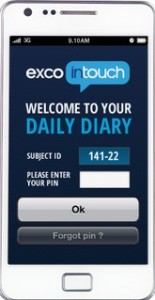 Exco InTouch's mobile clinical trial software.
Exco InTouch's mobile clinical trial software.
The FDA wants to know more about mobile-enabled clinical trials for investigational drugs. According to a recent post on the Federal Register by Associate Commissioner for Policy Leslie Kux, the FDA is soliciting comments "from a broad group of stakeholders on the scope and direction of the use of technologies and innovative methods in the conduct of clinical investigations".
"Clinical investigations that ensure the protection of the rights, safety, and welfare of trial participants and that yield reliable data are critical to FDA's mission to ensure that medical products are safe and effective," Kux writes. "Creative uses of technology in conducting clinical investigations have emerged over the previous decade and include advances that have the potential to improve recruitment, participation, and retention of trial participants."
Specifically, the FDA is seeking comments on technologies that enable remote clinical trials, where the research participants aren't physically involved with the trial. This could certainly someday include clinical trials that use Apple ResearchKit, which a number of pharma companies are rumored to be launching or considering launching.
"Some of these technologies and methods may be used regardless of the trial participant's location and may include, for example, mobile health technology, telemedicine, and remote sensors," Kux writes. "Use of these technologies and methods allows for more flexibility for the sponsor and clinical investigator in the oversight of clinical investigation conduct, data collection, and monitoring of trial participants and clinical sites. Other elements that may be incorporated into clinical investigations to improve trial participant recruitment include online/web-based eligibility screening, informed consent, and communication between investigators and participants."
In the notice, Kux notes that the FDA recognizes that some forward-looking companies have already been conducting clinical trials with various levels of mobile technology and are looking to learn from those experiences, both about what works and what doesn't -- what challenges and barriers companies have encountered. They're also particularly interested in delving into questions of privacy, security, and reliability of data in a remote trial context, including one where patients use their own consumer devices for data collection or data entry.
Over the summer the NIH put out a similar request for feedback on how companies are using mobile health tools in clinical research.
At the BIO 2015 conference in Philadelphia this year, a group of pharma stakeholders argued that remote trials are becoming more important to pharma not just because of the cost savings in an era when pharma margins are decreasing, but also because of the emerging conflict between personalized medicine, where expensive drugs are developed for small groups of patients, and the traditional clinical trial infrastructure.
“We have models of clinical development that were built for a blockbuster era,” Pfizer Head of Clinical Trial Innovation Craig Lipset said at the time. “…We need new approaches that are able to help us identify patients more appropriately, and other ways of capturing data, whether it’s partnering with health systems or partnering with patients to aggregate and share data on their own. Because in today’s state in healthcare, we as patients have unprecedented access to our own data, and our own ability to serve as data hubs and aggregators of our own data. And patients have that willingness to share their data to support research. When you couple that with different molecular approaches, that creates tremendous opportunities for us to actually scale clinical trials.”













